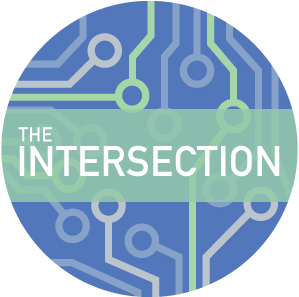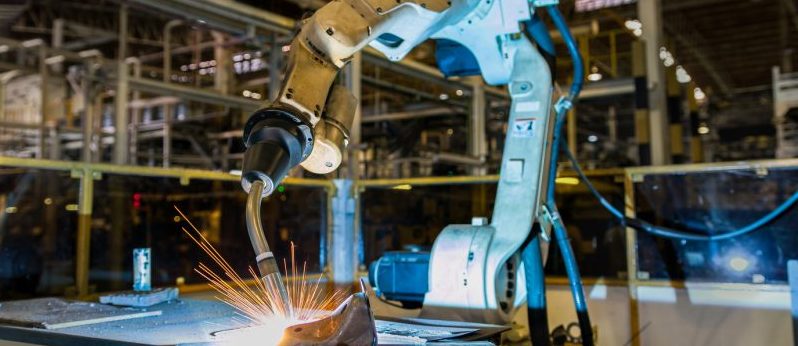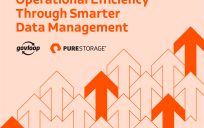 There has been a lot of talk lately about artificial intelligence in the news — some doom and gloom and healthy skepticism, but also a lot of optimism and success stories.
There has been a lot of talk lately about artificial intelligence in the news — some doom and gloom and healthy skepticism, but also a lot of optimism and success stories.
With all these swirling conversations, it can be hard to figure out what you — as a government employee — need to know. What does AI mean for your agency and why should you care?
To get answers to these and other questions, we sat down with Booz Allen Hamilton Vice President Angela Zutavern a pioneer in machine intelligence and data science strategies. Her work has helped numerous companies and government agencies, including the Census Bureau and Federal Aviation Administration make better decisions through human and machine partnerships. Zutavern is also the co-author of “The Mathematical Corporation: Where Machine Intelligence and Human Ingenuity Achieve the Impossible.”
Our conversation ranged from the basics to more in-depth questions about procuring AI and the future of government jobs.
GovLoop: What is artificial intelligence?
Zutavern: It’s the ability for computers and algorithms to learn on their own to perceive things around them and to act using data. Artificial intelligence has been around for 50 years. Artificial intelligence, along with high performance computing, make up the broader machine intelligence.
GovLoop: What does AI look like in government? How is it being used?
Zutavern: Right now, artificial intelligence is being used for narrow applications — narrow machine intelligence. And the reason is because the technology right now is really good at specific or well-defined tasks.
Something that government folks are hearing a lot of is robotic process automation (RPA). That’s where software bots can perform simple activities for people. That could be [tasks] like automatically sorting through inquiries or email or automating help desk or call center type operations.
We [also] see agencies taking on tougher problems. Things that we couldn’t solve in the past because we didn’t have enough data [or] computing power, or the technology just wasn’t there. And then the third area is mission improvement. And that goes beyond just cost savings or efficiencies. That is really taking the mission to the next level by using artificial intelligence to sort through and make meaning of tons and tons of data.
GovLoop: Which agencies are leading when it comes to AI capabilities?
Zutavern: One is NASA. They’re really out front because they don’t have just big data — they have huge data. One mission alone for NASA might generate 25 terabytes of data per day. In the past, we weren’t able to handle and process that amount of data, but now we can. One project that NASA’s working on is creating an AI robot doctor to treat people living in Mars. This robot doctor will not only be able to treat conditions that are known today, it will also be able to learn on its own unique conditions that might develop while living on Mars.
One of the lessons learned from NASA is that as impressive as AI is, it takes a leader or a set of leaders willing to come up with a vision, rally people around it, and challenge people to do something that’s never been done before. We call it shattering your own constraints because if that team didn’t believe that living on Mars was even possible in the first place, they certainly wouldn’t spend their careers building an AI doctor to treat people once they’re there.
Nancy Potok, [former] Chief Operating Officer of Census, and her entire team at Census challenged themselves to apply artificial intelligence to the 2020 census. For the 2020 census they will have a new mobile app, driven by machine intelligence. It’s going to predict when people will be home, what order to go in [to] houses, and give them advice on how to perform their routes and their data collections most efficiently.
GovLoop: Is there a tool or capability agencies use today that is similar to AI?
Zutavern: Any kind of analytics. This also includes agencies that are using statistics or other types of models that forecast. The difference with machine intelligence or artificial intelligence is the ability for the algorithms to learn on their own. All agencies are using some type of analytics. If they’re using simulation modeling — even Excel type calculation — that’s the first step along the way.
GovLoop: Are there special contract requirements for procuring AI capabilities?
Zutavern: There are definitely some special procurement requirements. One is open source. Within artificial intelligence, the open source world is so important. It’s very robust, and agencies want to have open source components and considerations to their overall solution. [They] don’t want to get locked into proprietary stuff. Whether it’s a full open source solution, or open source is one component of it, requiring that expertise, is huge, especially in the AI world where open source has led to a lot of the breakthroughs that have occurred.
A second one is requiring an experimentation type approach. With AI, you don’t build a model once and it works. You iterate many times, making improvements along the way until you get the accuracy that you’re looking for. If you think about most government contracting requirements, they like to lay out a well-defined process. AI solutions [are] not clean, well-defined process[es]. It’s an experimentation type approach, so we’ve got to figure out a way to build that in so there’s enough transparency and visibility.
Another is the need for diverse teams with diverse skillsets. The greater the number of different backgrounds you have on these project teams, the greater the innovation and the greater the creativity.
The last point is the way the government competes [in] these types of projects. What we’ve seen works best is some type of in-person challenge competition, where they bring in the competitors and you don’t know ahead of time what the challenge is going to be. And what that does is it allows the government to work side by side with these teams to see firsthand how they operate and how creative they are, and how they do an experimentation type approach. Those are things you just can’t measure in a written proposal.
GovLoop: Mark Zuckerberg recently did a Facebook Live chat and was asked about an interview where Elon Musk said his largest fear for the future is AI. What are your thoughts on AI and how it could affect the world?
Zutavern: I’m very optimistic about AI. AI does learn on its own, but it learns based on training datasets that we provide. I do think there are possibilities for AI beyond what we envision today, but I think that people are the ones who are influencing and implementing this technology. No matter what comes with the technology, people will shape it in a positive direction.
GovLoop: Should government employees be concerned about AI replacing them (their jobs)?
Zutavern: We should think of AI as a collaborator. What I mean by that [is] it will give us lots of input that we didn’t have before. It’ll make us better at our jobs. Will it automate some of those repetitive tasks? Absolutely, yes. If that’s somebody’s sole job, I think they would do well to develop other skillsets now. This isn’t going to happen overnight. For the vast majority of people, rather than replacing their jobs, it will improve their jobs. The same way that the computer and the internet helped us all do our jobs better, artificial intelligence will be the same type of influence.





Since Varian’s statements, interest in everything related to statistics has been increasing, both at the individual level (“How can I be trained to work as a data scientist?”) And in the social field, to the extent that what is known as the Big Data – that is, the availability of large amounts of data – promises to be the next great productive revolution. http://www.prodigitalweb.com/big-data-going-take-benefit-data/